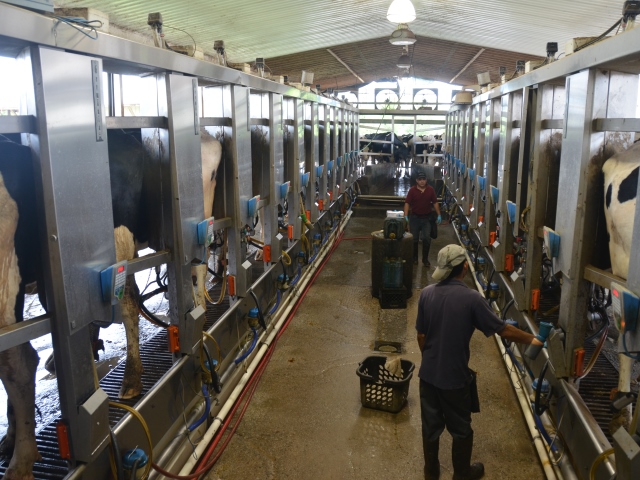
That’s because they’re in hospitals, working on the front lines of the fight against COVID-19. They’re taking extra time to prepare classrooms, hoping their efforts might lower the risk of an outbreak as students return. And they’re working on dairy farms, because wholesome nutrition is a never-ending need. Cows don’t stop producing milk because it’s a holiday. Dairy never stops, and neither will its workforce.
They deserve recognition every day, but today presents us a unique opportunity.
Even as technology becomes an ever-greater part of agriculture, much of dairy farming remains labor-intensive. Cows must be fed and milked two or three times a day, 365 days a year, around the clock. Many farmers rely on skilled workers and or family to care for their animals, milk cows and tend crops. The average dairy farm has five employees, and larger farms even more, making success a team effort. Together, dairy farmers, dairy workers and their families are pillars of rural communities nationwide.
That’s been especially true this year. As COVID-19 has upended supply chains and strained markets, dairy farmers and their workers have continued to milk, feed, clean, and provide the high-quality care for their animals. In the first days of the crisis, these workers were deservedly recognized as part of the nation’s essential critical infrastructure, an acknowledgement of the importance of their work. Their efforts have kept milk, cheese, and other dairy products in stores, refrigerators, food banks, and meal programs for children and seniors, providing essential nutrients in the diets of millions of Americans.
Dairy farms large and small have worked hard to make sure their farms continue to be a safe place for workers. Personal protective equipment has become an even greater priority in the milking parlor and has become commonplace during farm visits and virus-necessitated activities. Stepped-up sanitation measures also have been implemented to prevent the spread of disease, as have social distancing measures and additional training.
When Prairie Farms Dairy workers donated milk to community members in need in Illinois, masks were mandatory. Meanwhile, managers at Fair Oaks Farm in Indiana have been trained in capacity limitations for buildings and exhibits and are required to complete a health check assessment prior to returning to work and before each shift. Examples like these abound across the country. Together, the dairy industry through its FARM program has developed guidelines to reduce risk and prevent and control the spread of coronavirus in the workplace and on the farm, and farmers are continuing to adjust their operations based on federal guidance and these industry best practices.
Aside from the coronavirus, other challenges continue, and some are getting worse. A big challenge for the dairy workforce – part of an agricultural labor sector that is over half composed of immigrants – is that there simply aren’t enough native workers eager to work on dairy farms despite being offered higher wages and benefits. (Dairy farmers can speak out on their labor needs here.) NMPF has pursued agricultural labor reform for decades – the House of Representatives got closer to it late last year with the imperfect, but promising, Farm Workforce Modernization Act, but urgent attention to COVID-19 stopped progress cold in the Senate.
But like dairy farming itself, efforts to improve dairy’s labor situation can’t stop either. The H-2A guest-worker visa program, used by many in agriculture to attract seasonal foreign labor, doesn’t fit dairy’s year-round needs, but with a few tweaks could be improved to be workable. Without solutions, workforce uncertainty continues to harm individuals, businesses and communities. And dairy will continue to push for solutions.
What is certain is that dairy farmers working side by side with their workers will continue to rise to provide the nation with the healthy food it needs. Just as coronavirus has made people think more about who’s working to provide their food, the importance of those workers is as clear as ever. Dairy farmers are proud of the hard work that happens every day on their farms. And for everyone who today is getting a much-needed rest – we hope with a delicious dairy product – remember, as you enjoy it, that many of the people who helped get it to you are still on the job. And give thanks for their labor.

























